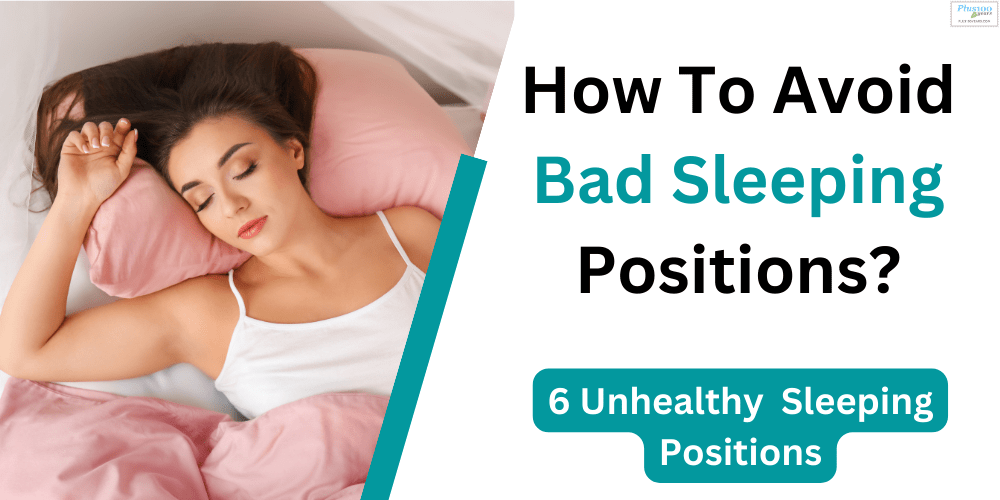
Sleep is an often overlooked aspect of health, but it can profoundly affect our overall wellness.
Many of us don't think twice about the sleeping positions we assume night after night. However, studies have revealed that our preferred sleeping stances can affect physical and mental well-being.
Poor sleep postures can be a factor in causing chronic neck and shoulder pain and may even limit blood flow to the heart. How To Avoid Bad Sleeping Positions?
Sleeping on the stomach has been associated with depression and anxiety due to pressure created on the diaphragm that limits oxygen intake.
To reap all of the benefits from a good night's rest, it's essential to choose one's sleep position carefully - aim for positions that promote even weight distribution throughout your body.
In this blog post, we'll explore some unhealthy sleeping positions people commonly adopt and how to avoid them.
1. The Fetal Position
The fetal position is one of the most popular sleeping positions, with around 41% of people opting for it.
This involves curling up into a ball with bent legs and arms close to the body. While this may seem comfortable at first, it can lead to neck and shoulder pain due to the unnatural curvature it causes in your spine.
It can also pressure your hips and knees, leading to joint pain.
If you must sleep in the fetal position, make sure that you have a pillow between your knees and ankles and one under your head and neck for support.
Also, keep your spine straight by avoiding hunching over too much when you curl up into a ball.
2. Sleeping On Your Stomach
Sleeping on your stomach is another unhealthy habit that many are guilty of — about 17% of people prefer this position when they hit the hay.
This puts unnecessary strain on your neck and lower back muscles as they have to support the weight of your torso all night long. It can also contribute to acid reflux since lying flat for an extended period can disrupt digestion.
To avoid these issues, try sleeping on your side instead, or consider investing in a body pillow so that you don't end up turning onto your stomach while asleep.
3. Sleeping On Your Back with Legs Crossed
Crossing your legs while sleeping may be comfortable initially, but it can cause numbness in the legs due to impaired circulation throughout the night.
Additionally, crossing one leg over another, places excessive stress on both hips, leading to hip pain later down the line if done regularly enough.
If you're used to assuming this position when napping or catching some z's at night, try swapping out crossed legs for putting both feet flat on the bed instead or investing in a thicker mattress if possible (this will help reduce pressure points).
4. Sleeping Face Down
Sleeping with your face down can have the opposite effect and add tension and stress to your neck, shoulders, and other muscles in your body.
Because our neck is designed to support our head when we are upright, during sleep, these joints can become tense when they must also bear the weight of our heads while resting on a pillow.
This extra strain contributes to increased rigidity in the neck which can cause morning discomfort or even trigger headaches.
Avoiding sleeping face down can help you feel more rested each morning and reduce any associated strain in this area of your body.
5. The Log Position
The log position involves lying flat with both arms resting by your sides.
While this may be comfortable for some people, it puts extra pressure on your spine and can cause lower back pain or neck aches if done for too long.
Additionally, this position does not provide any support for the head or spine, which can lead to poor posture during the day.
6.The Freefall Position
The freefall position involves lying flat on your stomach with arms above your head or in front of you.
This position has been linked to snoring due to restricted airflow caused by the tightness around the throat area caused by arm placement during sleep.
It also causes neck strain, leading to upper back pain from incorrect alignment between the head and shoulders during sleep.
Conclusion
It's important to remember that not all positions are created equal when getting quality restful sleep. Some positions might be more comfortable than others, but they could also be detrimental to our overall health if adopted regularly enough! How To Avoid Bad Sleeping Positions? Follow experts' tips to stay healthy
That being said, always ensure that you find whichever position works best for you while keeping comfort levels high and reducing any adverse effects on your physical well-being, such as bad posture or impaired circulation.
We would also recommend you read sleep position after the C-section to avoid complications post-surgery and recover quickly.

Add new comment